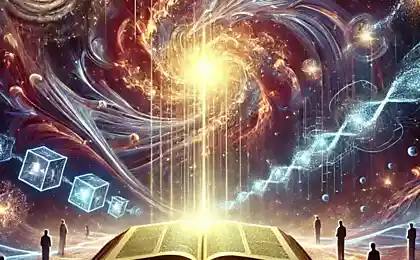679
The God of Einstein: Religion and freedom in an uncertain world of quantum mechanics
Eighteen million eight hundred forty seven thousand seven hundred eighty five
One evening in Berlin at a dinner party, which was attended by Einstein with his wife, one of the guests said that he believes in astrology. Einstein raised him to scorn, calling such a statement is pure superstition. The conversation took another guest who was equally disdainful of religion. Faith in God, he insisted, too, is superstition.
The owner tried to stop him, noticing that believes in God, even Einstein.
"This can't be happening," said a skeptical guest, turning to Einstein to see if he really is religious.
"Yes, you can call it so, replied Einstein. — Try using our limited resources, to understand the secrets of nature, and find that behind all discernible laws and connections remains something subtle, intangible and incomprehensible. The veneration of the forces behind the fact that is beyond our comprehension, and is my religion. In this sense, I'm really religious." Einstein is a boy believed enthusiastically, but then passed the transition to adulthood, and he rebelled against religion. The next thirty years he tried less to speak on this subject. But closer to fifty articles, interviews and letters, Einstein became clearer to formulate that deeper conscious of their belonging to the Jewish people and, moreover, to talk about their faith and their concept of God, albeit an impersonal and deistic.
Probably, except for the natural inclination of a person approaching fifty years, reflect on the eternal was for this and other reasons. Because of the ongoing oppression of Jews, Einstein had a sense of kinship with the tribe, which, in turn, in some measure again awakened his religious feelings. But mainly this belief was apparently the result of awe and the feeling of transcendental order, opened through the practice of science.
And captured the beauty of the gravitational field equations, and denying the uncertainty of quantum mechanics, Einstein felt an unwavering faith in the orderliness of the Universe. It was the basis not only of his scientific and religious worldview. "The greatest satisfaction felt by the scientist," — he wrote in 1929, realizing that "God himself could not make these relationships different, but not the way they are, and moreover, is not in His power to make the four was not the most important number."
For Einstein, as for most people, belief in something that transcends the self, was the feeling paramount importance. She had aroused in him a mixture of conviction and humility, mixed with simplicity. When the tendency to focus on himself such grace can only be welcomed. The ability to joke and tendency to introspection helped him to avoid the pretentiousness and pomposity that would impress even the most famous mind in the world. "Everyone seriously engaged in science comes to the conclusion that the laws of the Universe is manifest spirit, immeasurably superior to the spiritual possibilities of man»
The religious sense of awe and simplicity manifested in Einstein and in need of social justice. Even the appearance of hierarchy or class distinction was repulsive to him, which encouraged him to beware of excesses, not to be too practical, to help refugees and the oppressed.
Shortly after his fiftieth birthday, Einstein gave a startling interview where never as outspoken about his religious beliefs. He spoke with a bombastic, but charming poet and propagandist named George Sylvester Virek. Virak was born in Germany, he went to America as an adult, wrote a tasteless erotic poetry, interviewing great men, and talked about his complex love for the country.
In his piggy Bank he has collected so many different people, like Freud, Hitler and Kaiser, and over time from an interview with them was a book called Glimpses of the Great ("brief encounters with the great"). He managed to get a meeting with Einstein. Their conversation took place in his Berlin apartment. Elsa filed raspberry juice and fruit salad, and then they went upstairs into the study of Einstein, where no one can disturb. It is not clear why Einstein decided that Virek a Jew. In fact, virak proudly led his ancestry from the family of the Kaiser, and later became a fan of the Nazis during the Second world war were planted in America in jail as a German propagandist.
Two million eight hundred ninety six thousand two hundred ninety nine
Virek primarily asked Einstein whether he considered himself a Jew or a German. "You can be both replied Einstein. Nationalism is a childhood disease, the measles of mankind."
"Should Jews be assimilated?"— "To adjust, we Jews are all too willing to sacrifice their individuality".
"To what extent are you influenced by Christianity?"— "A child had taught me and the Bible and the Talmud. I'm Jewish, but I am tempted by radiating light to the personality of the Nazarene."
"Do you think that Jesus was a historical figure?» — «Certainly! You cannot read the Gospels without feeling the actual presence of Jesus. His individuality is heard in every word. No other myths, so filled with life." "Do you believe in God?""I'm not an atheist. This issue is too vast for our limited mind. We are in the position of a child who walks into a huge library, full of books in different languages. The child knows that someone must have been these books to write. But he doesn't know how it was done. He does not understand the languages in which they are written. The child dimly suspects in the arrangement of the books, a mysterious order, but did not know how. So, I think, relate to God, even the most intelligent people. We see amazingly arranged, obeying certain laws of the Universe, but only vaguely understand that these laws".
"This Jewish idea of God?""I'm a determinist. I don't believe in free will. Jews in free will believe. They believe that man himself is the Creator of your life. This doctrine I deny. In this respect, I am not a Jew".
"It's The God Of Spinoza?"— "I admire the pantheism of Spinoza, but even more I appreciate his contribution to modern learning process, as this is the first philosopher who considered the soul and the body as a whole and not as two separate entities". How were his ideas? "I was sufficiently master of his craft and can freely dispose of his imagination. Imagination is more important than knowledge. Knowledge is limited. Imagination refers to the outside world".
"Do you believe in immortality?» — «No. I have enough of one life".
Einstein tried to Express clearly. It was necessary for him and all those who wanted him to get a simple answer to the question about his faith. Therefore, in the summer of 1930 during a stay in Kaputa sailing on a sail, he thought, this worried his question and formulated their creed in the article "what I believe". At the end of it he explained what he means when he says that religious: the Most beautiful emotion we can experience is the sensation of the mystical. It is the fundamental emotion that stands at the cradle of all true art and science. He to whom this emotion is stranger, who can no longer wonder, transfixed in awe, and to experience awe, as good as dead, he extinguished the candle. To feel that everything that is given us in sensation, is something that is not available to our understanding, whose beauty and Majesty we are aware only indirectly, it is to be religious. This, and only this, sense, I am truly religious person. Many found that the text makes you think, even calls to belief. In different translations it was reprinted many times. But, unsurprisingly, he did not satisfy those who wanted to get a simple, direct answer to the question of whether Einstein believes in God. Now trying to get Einstein to explain succinctly what he believes, has replaced the previous insane quest for the explanation of the theory of relativity in one sentence.
Banker from Colorado wrote that he had already received from twenty-four Nobel prize winners answer to the question, whether they believe in God, and asked Einstein to join him. "I can't imagine a personal God, directly affect the behavior of an individual or preside over the trial of his own creatures — illegible hand-written Einstein on this letter. My religiosity consists in a humble admiration of the infinitely superior spirit to us, revealing himself in the little things, that we can comprehend accessible to our cognition of the world. This deep emotional conviction in the existence of a higher intelligence, finding itself in the incomprehensible universe, is my idea of God."
Teenage girl, a pupil of the sixth grade Sunday school in new York, put the same question somewhat differently. "Do scientists pray?"she asked. Einstein treated it seriously. "The basis of scientific research lies the assumption that everything that happens is determined by laws of nature, the same is true in relation to the actions of people, he explained. — It is hard to believe that a scientist would be inclined to believe that events could affect the prayer, that is, a wish addressed to a supernatural being".
However, this does not mean that there is no Almighty, there is no exceeding our spirituality. Einstein goes on to explain to the girl: Anyone seriously involved in science comes to the conclusion that the laws of the Universe is manifest spirit, immeasurably superior to the spiritual possibilities of man. In the face of this spirit we with our modest forces should feel humility. Thus, the pursuit of science lead to the emergence of a special religious feeling which actually differs significantly from the more naive religiosity of other people. Those who are under the religious would only understand the faith in a personal God that controls our daily lives, believed that the idea of Einstein about the impersonal space spiritual beginning, like his theory of relativity, must be called by its true name. "I have serious doubt that Einstein himself really knows what he's getting at", said the Archbishop of Boston, cardinal William Henry O'connell. But one thing he was clearly is atheism. "The result of these searches and vague reasoning about time and space is the mask under which hides a ghastly specter of atheism."
Public the curse of the cardinal prompted the famous head of the Orthodox Jews of new York Rabbi Herbert S. Goldstein, to send Einstein a telegram asking directly, "do You believe in God? End. Reply paid. 50 words". Einstein only used about half of the provided words. This text is the most famous answer to the question he so often asked: "I believe in the God of Spinoza, manifesting itself in all things subject to the laws of harmony, but not in God, fate and engaged in the Affairs of mankind."
And the answer Einstein was granted not all of them. For example, some religious Jews said that these beliefs Spinoza was expelled from the Jewish community of Amsterdam, moreover, the Catholic Church also condemned. "Cardinal O'connell would have done well, if not attacked Einstein's theory, said a Rabbi from the Bronx. — Einstein it would be better not announced his disbelief in God, preoccupied with the destinies and Affairs of men. Both deal with issues not falling under their jurisdiction". However, the Einstein's answer satisfied most people, regardless of whether they agree with him or not, because they were able to evaluate what was said. The idea of the impersonal God not involved in the daily lives of people, whose hand is felt in the greatness of the cosmos — part of the philosophical tradition adopted in Europe and America. This idea can be found in Einstein's favorite philosophers, and in General, it is consistent with the religious beliefs of the founding fathers of the American state, such as Jefferson and Franklin.
Some religious people is not recognized by the Einstein law often use the word "God" simply as a figure of speech. In the same way it was treated and some unbelievers. He called Him, sometimes quite humorously, in different ways. He could tell and der Herrgott (Lord God), and der Alte (the old Man). But not in the character of Einstein was to Dodge, padegimas to someone's tastes. In fact it was quite the opposite. So give him credit and believe the word when he insists, repeating over and over again that these words are not simple semantic cloaking and what in fact he is not an atheist.
All his life Einstein had consistently denied the accusation of atheism. "There are people who say that there is no God, he said to the other. But what really annoys me is the links to me to justify such beliefs".
Unlike Sigmund Freud, Bertrand Russell or George Bernard Shaw, Einstein never felt the need to denigrate those who believe in God. Rather, it is not encouraged atheists. "From most so-called atheists I separated a feeling of complete humility before not available to us the secrets of the harmony of the space," he explained. "People, vegetables, or cosmic dust, we all dance to fulfill an incomprehensible melody that strums from afar invisible musician" is actually more critical of Einstein was not religious people, and to denounce religion, not suffering from an excess of humility and a sense of awe. "The fanatical atheists, he explained in one of the letters, — like slaves who are still feeling the weight of the chains, relieved after heavy fighting. These creatures, called traditional religion the opium of the people, inaccessible music of the spheres".
The same subject, Einstein later will discuss with the Lieutenant, U.S. Navy, whom he had never met. Isn't it true, asked the sailor, a Jesuit priest turned you into a believer? It's absurd, said Einstein. He continued, stating that he believes faith in God, behaving as the father, the result of "childish analogies". If Einstein, asked the sailor, to quote his response in a dispute with more religious shipmates? Einstein warned that it is impossible to understand everything too simplistic. "You may call me agnostic, but I do not share the ardor of the professional atheist whose fervor is due mainly to the liberation from the shackles of religious education received in childhood, — he explained. — I prefer the restraint that complies with our weak intelligence, is not capable to understand nature, to explain our own existence". Fifty eight million seven hundred fifty six thousand ninety seven
In Santa Barbara, 1933, As the same is instinctively religious sense was incompatible with science? For Einstein the advantage of his faith was that she would rather have directed and inspired him, but did not come into conflict with scientific work. "Cosmic religious feeling, he said, is the most important and noblest motive for scientific work."
Later Einstein explained his understanding of the relationship between science and religion at the conference at new York United theological Seminary, addresses this issue. In science, he said, is figuring out what takes place, but not assessment of what a person thinks about how it should be. Religions have a very different purpose. But sometimes, their efforts add up. "Science can be created only by those whom are overwhelmed with the pursuit of truth and understanding, he said. — However, it is religion that is the source of this feeling". In the Newspapers the speech was covered as a major news, but its concise conclusion has become famous: "This situation can be represented as follows: science without religion is crippled, religion without science is blind."
But a religious concept, continued to insist Einstein, science can not agree. We are talking about the deity, which on a whim can intervene in the course of events in the world created by him and in the lives of his creatures. "Today the main source of the conflict between religion and science is associated with the idea of a personal God," he argued. The goal of scientists is to discover the immutable laws that govern reality, and in doing so, they must discard the notion that the sacred will or, for that matter, the human will can lead to a violation of the universal principle of causality.
Belief in causal determinism, being an integral part of the scientific Outlook of Einstein, have come into conflict not only with the idea of a personal God. She was, at least according to Einstein, incompatible with the idea of human free will. Although he was a deeply moral man, the belief in strict determinism made it difficult for him the perception of concepts such as moral choice and individual responsibility that are the Foundation of most ethical systems.
As a rule, both Jewish and Christian theologians believe that people are given free will and that they are responsible for their actions. They are so free that they can even, as the Bible says, to neglect the orders of the Lord, though, as it seems, it is contrary to the belief in the Almighty and omniscient God. Einstein, on the other hand, like Spinoza, believed that human action is deterministic to the same extent as the movement of a billiard ball, planet or star. "Thoughts, feelings and actions of human beings are not free and equally bound by the principle of causality, like the stars in your movement," publicly declared Einstein in a statement to the American spinozist society in 1932.
He believed that people's actions independently governed by the laws of both physics and psychology. To this point of view brought him, and the reading of Schopenhauer, as in his credo, 1930 "what I believe" he says: I don't believe in free will in the philosophical sense. Each of us acts not only influenced by external causes, but also according to internal needs. The statement of Schopenhauer: "Man can do as he wishes, but cannot desire at will" — has inspired me since my youth; it was a comfort to me, the face of life's hardships, my own and other people and an inexhaustible source of tolerance. Would you believe, Einstein was once asked, are people free in their actions. "No, I'm a determinist, he replied. — All beginning in the same way as the end is determined by forces we can not control. Everything is predetermined for the insect as well as the star. People, vegetables, or cosmic dust, we all dance to fulfill an incomprehensible melody that strums from afar by an invisible musician."
These views have led to the confusion of some of his friends. For example, Max born believed that they completely undermine the foundations of human morality. "I can't understand how you combined into one fully mechanistic universe, and the moral freedom of man, he wrote to Einstein. A fully deterministic world it sickens me. Maybe you're right and the world is as you say. But at the moment, it seems that even in physics it is not, not to mention the rest of the world".
For Bourne, the uncertainty of quantum mechanics was it possible to resolve this dilemma. Like some other philosophers of that time, he seized on the uncertainty inherent in quantum mechanics, as for the opportunity to get rid of the "contradictions between ethical freedom and strict natural laws". Einstein, recognizing that quantum mechanics casts doubt on a strict determinism, replied Bourne that still believe in him, as in relation to the behavior and in physics.
Bourne explained the differences quite nervous of his wife Hedwig, always ready to argue with Einstein. This time she said that, like Einstein, "one cannot believe in God playing dice", in other words, unlike her husband, she rejected quantum-mechanical view of the Universe based on uncertainty and probability. But, she added, "I also can't believe that you, like I said Max, I believe that your absolute rule of law means the predestination of all, for example, am I going to do child vaccinated." It would mean, she pointed out, the end of all morality. Forty three million ninety six thousand nine hundred twenty five
On the ocean, in Santa Barbara, 1933 In philosophy Einstein a way out of this predicament was as follows. Free will should be considered as a useful, even necessary, for a civilized society because it makes people take responsibility for their actions. When man acts as if he was responsible for his actions, that from the point of view of psychology, and in practice it encourages a more responsible behavior. "I have to act as if free will exists, he explained, is because if I want to live in a civilized society I must act responsibly". He was even willing to consider people responsible for everything good or bad that they do, because it was pragmatic and sensible approach to life, while continuing to believe that the actions of each is predetermined. "I know that from the point of view of the philosopher, the murderer not responsible for his crime, he said, — but I prefer not to drink tea with him".
To justify Einstein as max and Hedwig of Bornou, it should be noted that philosophers for centuries have tried, sometimes too cleverly, and not very successfully, to reconcile free will with determinism and omniscient God. It doesn't matter if you knew that Einstein was something more than the other, which would allow him to cut this Gordian knot, one thing is undeniable: he was able to formulate and apply rigorous principles of personal morality. This is true at least when it comes to all mankind, but not always, when it comes to members of his family. And philosophizing about these unanswered questions it did not interfere. "The most important human desire — the struggle for the morality of his behaviour — he wrote a Brooklyn priest. — Our inner balance and even our very existence depend on it. Only morality in our actions can provide a life of beauty and dignity."
If you want to live, benefiting mankind, believed Einstein, the foundations of morality needs to be important "exclusively personal". At times he was violent towards the family, that only means that like all of us, people, he was not without sin. However, more often than most other people, he sincerely and sometimes it required courage, tried to contribute to the progress and protection of individual liberty, believing that it is more important than his own selfish desires. Actually, he was warm, kind, noble, and modest. When they are with Elsa in 1922 he left Japan, he gave her daughters advice on how to live morally. "You settle for small,' he said, and let the other lot".published From the book by Walter Isaacson about albert Einstein, prepared by the publishing house Corpus.
Source: theoryandpractice.ru























